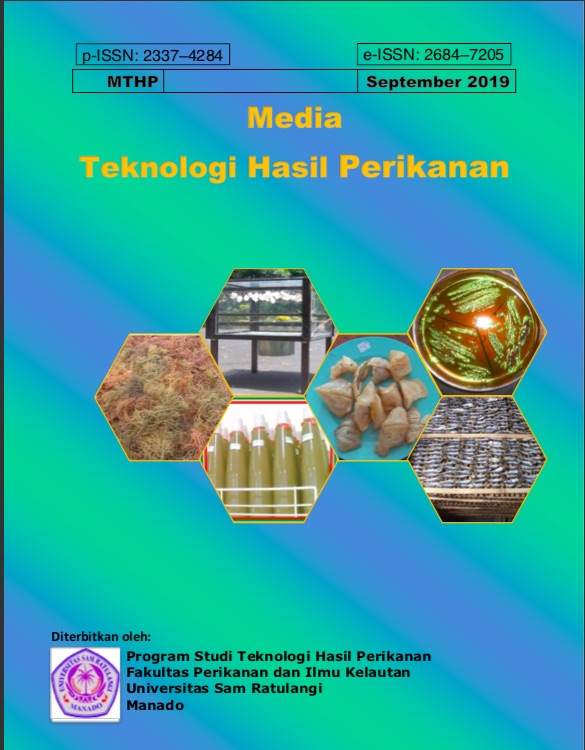AKTIVITAS ANTIBAKTERI AIR REBUSAN DAUN MANGROVE Sonneratia alba
DOI:
https://doi.org/10.35800/mthp.7.3.2019.23623Keywords:
Mangrove Sonneratia alba, infusa, antibakteriAbstract
tradisional untuk mengobati beberapa penyakit. Penggunaan daun, buah, kulit kayu, batang, akar dan buah dari beberapa spesies mangrove dan memiliki senyawa yang bersifat antibakteri. Tujuan dari penelitian adalah untuk mengetahui aktivitas antibakteri yang terdapat pada ekstrak daun mangrove Sonneratia alba untuk menghambat bakteri S. aureus danE. coli. Menggunakan metode ekstraksi infusa dengan cara direbus selama  10, 20, dan 30 menit setelah itu di rebus kembali dengan air api kecil kemudian di keringkan dalam oven dengan suhu 75-80°C dengan konsentrasi ekstrak 50.000 ppm dan 10.000 ppm, kontrol positif (kloramfenikol), dan kontrol negatif (aquades). Hasil pengujian antibakteri menunjukkan bahwa ekstrak air rebusan daun mangrove Sonneratia albamempunyai aktivitas paling besar pada perlakuan 30 menit konsentrasi 100.000 ppm terhadap bakteri E. colididapatkan rata-rata zona hambat sebesar 11,7 mm. Sedangkan pada bakteri S. aureus, paling besar pada perlakuan 30 menit konsentrasi 50.000 mendapatkan rata-rata zona hambat sebesar 7,5 mm.
Â
Downloads
Published
How to Cite
Issue
Section
License
Authors who publish with this journal agree to the following terms:
- Authors retain copyright and grant the journal right of first publication with the work simultaneously licensed under a Creative Commons Attribution License that allows others to share the work with an acknowledgement of the work's authorship and initial publication in this journal.
- Authors are able to enter into separate, additional contractual arrangements for the non-exclusive distribution of the journal's published version of the work (e.g., post it to an institutional repository or publish it in a book), with an acknowledgement of its initial publication in this journal.
- Authors are permitted and encouraged to post their work online (e.g., in institutional repositories or on their website) prior to and during the submission process, as it can lead to productive exchanges, as well as earlier and greater citation of published work (See The Effect of Open Access).






